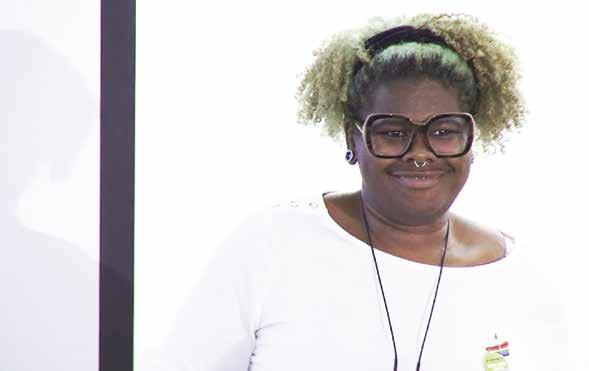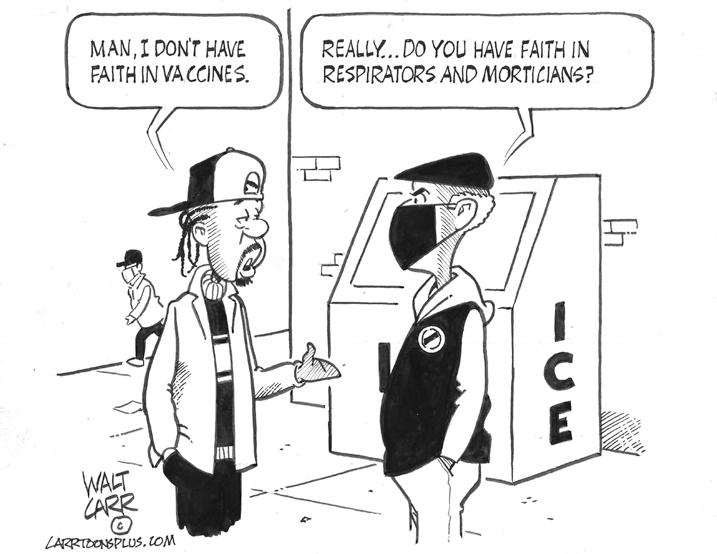EDUCATION Student Data Collection Mired in Controversy Sam P.K. Collins WI Staff Writer Over the last decade as a special education teacher, Dr. Dawn Welters has often had to collect data about her students and chart a path for their academic success using quantitative information passed on from previous instructors. Even with pre-COVID data, Welters said continuing that tradition has proven difficult because of what she described as the perilous conditions of virtual learning and time constraints imposed upon her and her colleagues. “We have to collect data and sometimes [administrators] give us a specific time window to do
some of those things and it’s not enough for me and my students,” said Welters, who works with six deaf and hard-of-hearing elementary students. “It’s been overwhelming collecting data this year,” she added. “From what I’m seeing, there’s been some improvement, but not what’s expected during the school year. We should be seeing more of an improvement with students by this time but they’re not [yet] up to their full potential.” Welters’ concerns come amid the release of a report from the Office of the D.C. Auditor (ODCA) that details the lack of District-wide, longitudinal data about District students, what officials deemed more than necessary during a pan-
5 Dr. Dawn Welters (Courtesy photo)
“From what I’m seeing, there’s been some improvement, but not what’s expected during the school year. We should be seeing more of an improvement with students by this time but they’re not [yet] up to their full potential.” demic where students have experienced learning loss. On March 10, ODCA officials contended that the District hasn’t created the means to determine
what each student learns each year, nor do they have any idea about student-teacher linkages. Without such data, OSSE would be unable to predict which students are the
For Most Teachers, an Extremely Tough Road Lies Ahead
State Board Survey Hints at Massive Teacher Exodus Sam P.K. Collins WI Staff Writer As various local institutions attempt to return to pre-COVID activity levels, teachers too are mulling when, and even whether, to reenter the classroom. Though many have embraced on-campus safety protocols and taken vaccinations, there remains the question of the pandemic’s impact on student learning. For Gina Abrams, the pandemic placed teachers in a tough position, as many were still expected to successfully provide grade-level instruction to students with significant pandemic-related learning gaps. She said administrators often placed the onus on her to not only articulate complicated concepts to students, but compete with forces at home
22 APRIL 1 - 7, 2021
that impeded their progress. “It was hard for the students to access that material but they were still tested with the same type of benchmarks. Why would you expect them to be at a [certain] level if they didn’t finish kindergarten?” said Abrams, a first grade DCPS teacher. “I don’t know how the kids will make up all that loss. Summer school won’t solve it. Maybe being in person might help, but [DCPS] dropped the ball when they made us start the [grade-level] curriculum, not what students missed.” As shown in a survey conducted by the D.C. State Board of Education, several teachers share Abrams’ sentiments. The survey, released in March, showed that nearly half of teachers in the District’s public and public
charter sectors considered leaving the profession because of difficulties encountered during the pandemic. Two out of three teachers said they couldn’t cover the same amount of content during virtual learning as had been the case during in-person instruction. More than three out of four teachers indicated that students had internet that was too slow for virtual learning, while three out of five recounted students experiencing computer issues. The survey also highlighted inequities among students in Wards 7 and 8 and concerns among nearly seven out of 10 teachers about being unable to meet their students’ increasingly strong socio-emotional needs. In response to the survey, D.C. Public Schools (DCPS) Chan-
cellor Lewis Ferebee highlighted the launch of Rigorous Instruction Supports Equity, a federally funded program through which teachers at 43 schools receive equity-centered professional development and performance-based incentive awards. As teachers increasingly make the return to campuses across the District, some like Andrew Green said they look forward to the opportunity to effectively instruct their students. Given the hurdles faced while conducting virtual learning, Green pondered why District officials couldn't make these arrangements earlier. “Every part of the school day is affected by inequities,” he added. WI @SamPKCollins
most likely to repeat a grade in high school. According to officials, the lack of data has also left them in the dark about the progress of each public and public charter school graduate in postsecondary studies and workforce development. Last month, a survey conducted by the DC State Board of Education found that less than one-third of teachers have been able to cover the same amount of content in the virtual learning space as would have been the case under normal circumstances. Teachers also reported lower levels of student engagement in Wards 7 and 8. D.C. Councilmembers Mary Cheh (D-Ward 3) and Robert White (D-At large), both of whom led efforts for the data collection revamp with the introduction of legislation nearly three years ago, said such an undertaking would help students falling further behind during the pandemic. Erin Roth, ODCA’s director of education research, shared their sentiments. “The District needs data to plan supports and interventions, and they need it going back as many grades as possible,” Roth said. “Our current data collections have been significantly disrupted, but other states are relying on coursework, survey data, and other predictive tools to ensure students are staying on track. This needs to be used in D.C. We can invest in it right away to build it.” WI @SamPKCollins
THE WASHINGTON INFORMER / WWW.WASHINGTONINFORMER.COM







